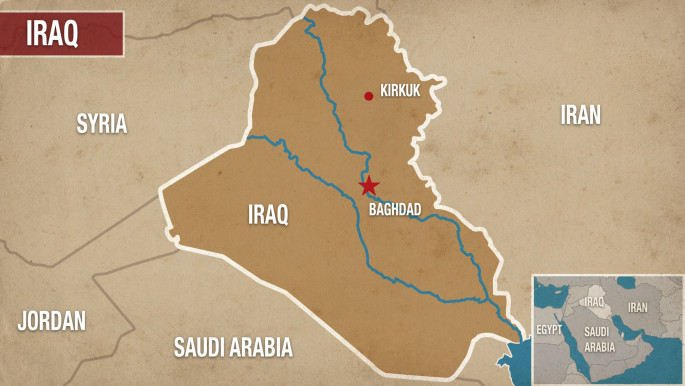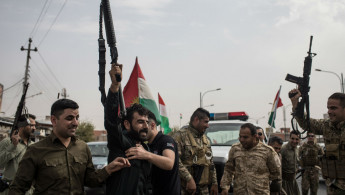Baghdad-Erbil standoff triggers an 'arms race' in mixed Kirkuk
In-depth: The standoff between Baghdad and Erbil following the Kurdish vote in favour of independence in September is triggering an 'arms race' in the ethnically mixed disputed city of Kirkuk
4 min read
Kirkuk could become the spark of a new ethnic war in northern Iraq [Getty]
The ongoing standoff between Baghdad and Erbil following the Kurdish vote in favour of independence in September is triggering an 'arms race' in the ethnically mixed but disputed city of Kirkuk.
As the Turkmen and Arab communities scramble to protect themselves from what they see as an imminent Kurdish takeover of their neighbourhoods, the prices of small and medium arms on the black market have soared, sourced in the city told The New Arab's sister Arabic publication.
In the past two weeks alone, the price of one unit of AK-47 Russian-designed assault rifle has touched a million dinars ($800).
Other weapons being sold include handguns and grenades, offered by arms dealers – including on Facebook – who are sourcing their merchandise from the equipment left behind by IS fighters in recaptured areas nearby such as Hawija, according to local sources.
"The weapons come from war profiteers", usually people who work in the security services, says local resident Mohammed Abdullah. He bought a Beretta pistol for about a $1,000.
"I will not use it in the street, but only if my home or my family is attacked. In the meantime I'm trying to go to Istanbul, but I need to sell my house to a Turkmen like me or an Arab," he said.
The last time this weapon-buying frenzy was seen was in 2014, when the Islamic State extremists were at the gates of the city. IS never entered the city, but Kurdish Peshmerga forces took control that same year when the Iraqi army withdrew.
| Read more: Kirkuk a tense flash point ahead of Iraqi-Kurdish referendum |
Kirkuk is an oil-rich, multi-ethnic province with Kurds, Arabs and Turkmen 280 kilometres north of Baghdad designated since 2003 as 'disputed'. But Kurdish nationalists claim Kirkuk as their own.
"We don't want to be the weakest link in the city, we want to be prepared for the worst-case scenario," Mohammed Oglo, a Turkmen resident, told The New Arab.
"We will not attack anyone but we are monitoring the activities of Kurdish racist groups in Turkmen neighbourhoods," he added, saying the city is fully controlled by the Kurdish Peshmerga and Asayish (police) who are "biased".
 |
We don't want to be the weakest link in the city, we want to be prepared for the worst-case scenario |  |
Amid threats from the Iraqi government to retake Kirkuk by force if the Kurdistan Regional Government does not hand it over, the Turkmen residents of the city say they don't trust Baghdad.
 |
"The Turkmen are seeking to protect themselves because they have no trust in the Iraqi authorities, which could abandon Kirkuk in return for oil fields or political deals with Iran or the United States," said Oglo.
According to Jassem Mohammed Jaafar, a Turkmen MP, offices of the Iraqi Turkmen Front in the city suffered six attacks in the past two weeks, involving machine guns and grenades. He says security measures around the homes of Turkmen leaders in the city have been reinforced.
"The Turkmen are under a serious threat from a systematic Kurdish expansion into their districts in Kirkuk," Fawzi Akram, another Turkmen MP, told The New Arab. Akram claimed there is pressure on the Turkmen community to leave the city, urging Baghdad to intervene.
According to reports, Kurdish civilians in the city are also purchasing weapons, in anticipation of the possibility the Kurdish armed factions might withdraw from the city.
 |
Kirkuk could become the spark that ignites the conflict in northern Iraq - Iyad Allawi, Iraqi VP |
 |
In this situation, and amid threats made by the pro-Baghdad Popular Mobilisation Units over Kirkuk, Iraqi Vice President Iyad Allawi warned this week of a 'civil war' in Kirkuk if no compromise is found. Allawi said he called on all sides to show self restraint and resolve the differences quickly.
"Kirkuk could become the spark that ignites the conflict in northern Iraq," he added.
Meanwhile, Iraq and Turkey have stepped up their efforts to isolate the Kurdistan region by moving to reopen a disused oil pipeline between the two countries.
The pipeline, which bypasses Kurdistan, runs from Kirkuk to Mediterranean port of Ceyhan in Southern Turkey. The pipeline was damaged in areas occupied by IS until Iraqi forces regained control of the region late last year.
Since last month’s Kurdish Independence referendum Baghdad has been piling pressure on Iraqi Kurds to reverse the independence vote. It has taken a number of measures against Erbil including taking control of borders and a ban on international flights to and from Iraqi Kurdistan’s airports.
(Reporting by Othman al-Mukhtar, translation and additional writing by Karim Traboulsi)





 Follow the Middle East's top stories in English at The New Arab on Google News
Follow the Middle East's top stories in English at The New Arab on Google News


